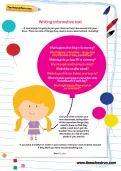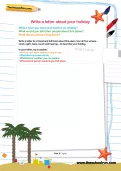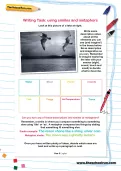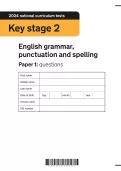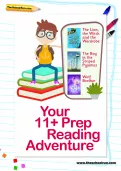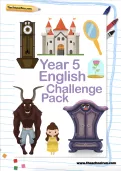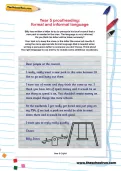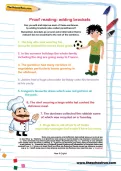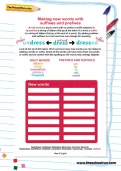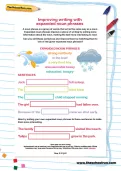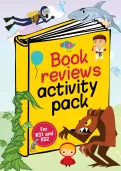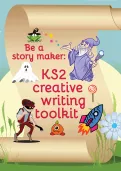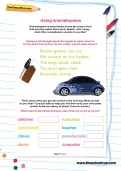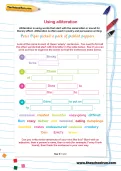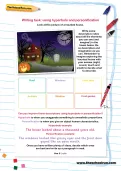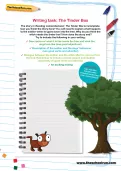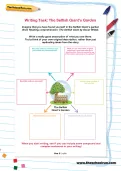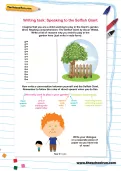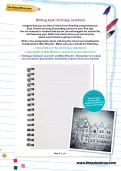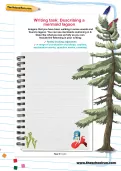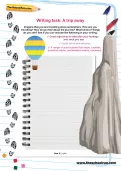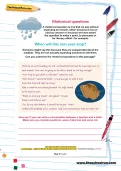Help your child prepare for the Year 6 English SATs, taken at the end of Key Stage 2, with some revision and at-home practice. These KS2 SATs past papers from 2024 are the official past papers from the Department for Education, used in schools.
or
Register to add to your saved resources
Reading is an 11+ exam preparation superpower! Each of the 40 books in our 11+ exam prep reading adventure has been chosen to act as a story-filled portal to new vocabulary and will help your child get to grips with challenging texts the fun way – no flashcards required!
or
Register to add to your saved resources
Already a subscriber? to view this content.
Challenging reading comprehensions and activities for Year 5 readers and writers, designed to stretch your child and offer them the opportunity to explore their year-group topics in greater depth.
or
Register to add to your saved resources
Already a subscriber? to view this content.
Billy has written a letter to try to persuade his local council that a new park is needed in the area. The language is very informal. Do you think his letter will be taken seriously? Your task is to keep the ideas in the letter the same but rewrite it using the more appropriate formal language that is needed when writing a persuasive letter to someone you don’t know.
or
Register to add to your saved resources
Already a subscriber? to view this content.
Can you edit and improve each of these sentences by adding brackets (also called parentheses)?
or
Register to add to your saved resources
Already a subscriber? to view this content.
Look at the word list. Work out how many new words you can make by adding a prefix or suffix. Some of the words can have more than one prefix or suffix and be careful with the spelling as the words may change slightly!
or
Register to add to your saved resources
Already a subscriber? to view this content.
A noun phrase is a group of words that act in the same way as a noun. Expanded noun phrases improve a piece of writing by adding more information about the noun, making the text more interesting to read. Can you edit these sentences and improve them by matching them to one of the given expanded noun phrases?
or
Register to add to your saved resources
Already a subscriber? to view this content.
Help your child explore books and language with TheSchoolRun's Book reviews activity pack, a huge collection of reading comprehension and creative writing resources for Year 1 to Year 6.
or
Register to add to your saved resources
Already a subscriber? to view this content.
Does your child long to write stories? Our KS2 creative writing toolkit is packed with writing prompts to inspire them and gorgeously-illustrated pages to write on.
or
Register to add to your saved resources
Already a subscriber? to view this content.
Onomatopoeia is describing a sound by using a word that actually makes that sound. Splash, whir, clang... what other onomatopeic sounds do you like? Think about when you get into school in the morning. What sounds do you hear? Use this table to help you and then write your own poem similar to the one above (it doesn’t have to rhyme!).
or
Register to add to your saved resources
Already a subscriber? to view this content.
Alliteration is using words that start with the same letter or sound for literary effect. Alliteration is often used in poetry and persuasive writing. Look at the name in each of these ‘empty’ sentences. You need to find all the other words that start with this letter in the table below. See if you can work out how to organise the words so that the sentences make sense.
or
Register to add to your saved resources
Already a subscriber? to view this content.
Look at this picture of a lake at night. Write some descriptive notes about all the elements you can see (and imagine!). Be as descriptive and imaginative as you can. Now can you turn any of these descriptions into similes or metaphors?
or
Register to add to your saved resources
Look at this picture of a haunted house. Write some descriptive notes about all the elements you can see (and imagine!). Be as descriptive and imaginative as you can. Remember to imagine exploring the
haunted house with your senses (sight, sound, touch and smell) to decide what to describe. Now, can you improve these descriptions using hyperbole or personification?
or
Register to add to your saved resources
Already a subscriber? to view this content.
The story in Reading comprehension: The Tinder Box is incomplete. Can you finish the story here? You will need to explain what happens to the soldier when he goes down into the tree. Why do you think the witch needs the tinder box? How does the story end? Try to include good adjectives, correct speech punctuation and plenty of good verbs and adverbs in your writing.
or
Register to add to your saved resources
Already a subscriber? to view this content.
Imagine that you have found yourself in the Selfish Giant’s garden (from Reading comprehension: The Selfish Giant by Oscar Wilde). Write a really good description of what you see there. Try to think of your own original description, rather than just replicating ideas from the story.
or
Register to add to your saved resources
Already a subscriber? to view this content.
Imagine that you are a child wanting to play in the Selfish Giant’s garden. Write a list of reasons why you want to play in the garden here (just write in note form).
or
Register to add to your saved resources
Already a subscriber? to view this content.
Imagine that you are Sara Crewe (from Reading comprehension: Sara Crewe) arriving at boarding school on your first day. You are dressed in clothes that are far too extravagant for school life, sad because your father has had to leave you and anxious about what school is going to be like. Write a few paragraphs about entering the school and meeting the headmistress, Miss Minchin.
or
Register to add to your saved resources
Already a subscriber? to view this content.
Imagine that you have been walking in some woods and found a lagoon. You can see mermaids swimming in it. Describe what you see as fully as you can.
or
Register to add to your saved resources
Already a subscriber? to view this content.
Imagine that you are travelling alone somewhere. How are you travelling? How do you feel about the journey? What kinds of things do you see? See if you can include good adjectives, verbs and adverbs and a range of punctuation in your writing.
or
Register to add to your saved resources
Already a subscriber? to view this content.
A rhetorical question is one that we ask without expecting an answer, either because it has an obvious answer or because we have asked the question to make a point, to persuade or for literary effect. Now see if you can write a conversation between a teacher and a child. Make sure you include questions, some rhetorical and some not.
or
Register to add to your saved resources
Already a subscriber? to view this content.
